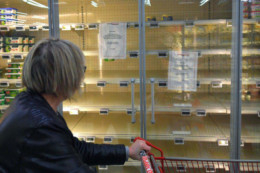
Paris: It is hard to imagine a country where butter is taken more seriously than it is in France.
It is a staple of sauces and baking alike. Without butter, or beurre in French, the croissant would be a leaden mass of flour, and the jambon-beurre sandwich missing a certain something. The Rouen Cathedral is said to have been built in part on the back of butter fees, and even today, in the western region of Brittany, salted butter is something of a religion.
So an empty butter shelf in France is like a dry baguette: deeply disconcerting.
But with a slump in European dairy production and a surge in world demand, that is exactly what some French are encountering in their stores.
Alarmed by news reports about the shortage, Laurence Meyre, a 53-year-old professor shopping in a sup-ermarket in southern Paris one recent morning, said she had made sure to stock up. “I thought to myself: Not having butter in France, that’s appalling,” she said.
In truth, the shortages, though noticeable nationwide, have been sporadic, and France gives no appearance of grinding to a halt. But in a country that by some measures consumes more butter per head than anyplace else, that is a fine point.
And so French news outlets are giving advice on how to replace butter or to churn your own. One headline asked whether there would be butter for Christmas. The agriculture minister faced questions in Parliament. Online, shoppers shared pictures of empty shelves, and jokers ran fake advertisements offering small amounts of butter for ludicrous prices. Inevitably, a #BeurreGate hashtag popped up.
Mismatch
Last year, France consumed about 8.15kg of butter per capita, according to statistics from a coming report by the International Dairy Federation. That is over twice the European Union average, and more than three times the figure in the United States.
Gerard Calbrix, the head of economic affairs at the Association of French Dairy Processors, said the industry had been expecting a crunch since spring. “Over the past year, from June of 2016 to this summer, milk production has fallen in Europe,” he said. “At the same time, demand for butter has increased, on all world markets.”
Several factors help explain the mismatch, according to Calbrix and other analysts. Dairy production in Europe, already falling since EU milk quotas ended in 2015, slumped after the summer of 2016 because of bad yields from fodder crops and unfavourable weather.
Meanwhile, as butter has shed some of its unhealthy image, demand has risen worldwide, especially in the United States — where the fast-food chain McDonald’s promised to put butter back in its recipes last year — and in China.
In France alone, butter consumption increased 5 per cent from 2013 to 2015, according to a recent report by an umbrella organisation for France’s dairy industry, Le Cniel.
The result? Butter prices have spiked, rising to nearly $8,000 (Dh29,384) a tonne in September from roughly $2,800 in April 2016.
Tensions with suppliers
But only France has seen shortages, because of the way its food supply chain is organised. In France, Calbrix explained, prices between suppliers and big retailers are negotiated once a year, in February.
“The absence of certain products on shelves is an indicator of tensions between some large retailers and their suppliers,” Le Cniel said in its report, noting that many retailers were refusing to pay the increased market price for butter.
The government has suggested that fears of a mass shortage are overblown.
Stephane Travert, France’s agriculture minister, acknowledged on Wednesday that pricing disagreements between producers and distributors were keeping butter out of some stores, but he told France Inter radio that “strictly speaking, there is no shortage.”
Industries that use butter, like bakeries and pastry shops, have had no choice but to pay up and, in some cases, to pass on their increased costs, according to Matthieu Labbe, the managing director for the Federation of Bakery Cos.
Could they make do with cheaper substitutes, like margarine? Don’t even think about it.
“There’s no comparison,” Labbe said. “If you want to preserve the quality of our products, you have to use butter — you can’t do anything else.”
For La Trinitaine, a family-run maker of local delicacies in the Morbihan region of southern Brittany, it has been slightly harder and more expensive to secure a steady supply of butter, according to Annabelle Cantin, the company’s head of marketing and communications.
“Butter and salted butter are part of the founding elements for recipes in Brittany,” she said. “So yes, we are inevitably affected, and have been for several months now.”
Christmas demand
It is unclear how long the shortages will linger. The government argues that production traditionally picks up in the winter, but the industry counters that demand also increases toward Christmas.
Some shoppers like Meyre have stockpiled butter, worsening the scarcity. But when she went back to the supermarket several days after doing so, she found the refrigerated butter shelves still half full.
“I’m getting the slight impression that we got scared for nothing,” Meyre said.
— New York Times
News Service












